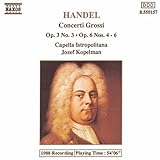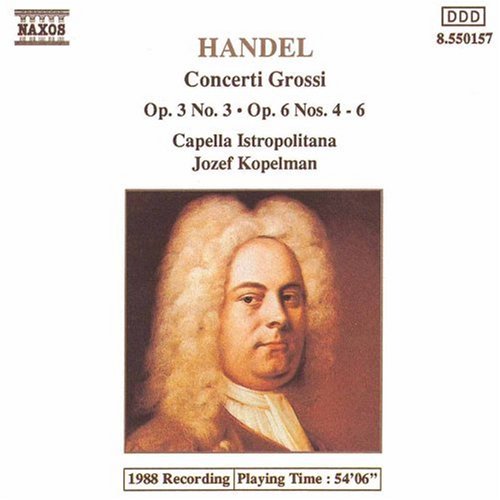Disco de Georg Friedrich Händel: «Handel: Concerti Grossi, Op. 3 No. 3 & Op. 6 Nos. 4-6»

- Valoración de usuarios: (3.0 de 5)
- Título:Handel: Concerti Grossi, Op. 3 No. 3 & Op. 6 Nos. 4-6
- Fecha de publicación:1994-02-15
- Tipo:Audio CD
- Sello discográfico:Naxos
- UPC:730099515726
- 1Con Grossi: Op.3 No.3 in G: Largo e staccato
- 2Con Grossi: Op.3 No.3 in G: Allegro
- 3Con Grossi: Op.3 No.3 in G: Adagio
- 4Con Grossi: Op.3 No.3 in G: Allegro
- 5Con Grossi: Op.6 No.4 in a: Larghetto affettuoso
- 6Con Grossi: Op.6 No.4 in a: Allegro
- 7Con Grossi: Op.6 No.4 in a: Largo, e pno
- 8Con Grossi: Op.6 No.4 in a: Allegro
- 9Con Grossi: Op.6 No.5 in D
- 10Con Grossi: Op.6 No.5 in D: Allegro
- 11Con Grossi: Op.6 No.5 in D: Presto
- 12Con Grossi: Op.6 No.5 in D: Largo
- 13Con Grossi: Op.6 No.5 in D: Allegro
- 14Con Grossi: Op.6 No.5 in D: Menuet; Un poco larghetto
- 15Con Grossi: Op.6 No.6 in g: Larghetto e affettuoso
- 16Con Grossi: Op.6 No.6 in g: Allegro ma non troppo
- 17Con Grossi: Op.6 No.6 in g: Musette: Larghetto
- 18Con Grossi: Op.6 No.6 in g: Allegro
- 19Con Grossi: Op.6 No.6 in g: Allegro
Handel, Concerti Grossi: Op. 3, No 3; Op 6, Nos 4-6. Capella Istropolitana, Josef Kopelman, conductor. Naxos 8.550157)
Handel's publisher John Walsh published two sets of his concerti grossi: one of six concerti as Opus 3 in 1734, the other of twelve concerti as Opus 6 in 1740. Handel frequently borrowed from his earlier music to create "new" works for special occasions or purposes, and these concerti are no exception, although many of the individual movements were actually newly composed. But some of these works might more accurately be described as assembled rather than created. That doesn't detract from the quality of the music: Handel's lush melodies, stirring counterpoint (almost as impressive as Bach's), and his driving allegros and luxurious largos make for wonderful listening.
This CD contains four of the best concerti. The Opus 3, No. 3 in G Major pits a violin and an oboe (alternatively a flute) against strings and basso continuo and borrows some of its music from the earlier Chandos Anthems. The three selections from Opus 6 feature two violins and a cello as the concerto instruments. No. 5 is probably the best known concerto of this set, but the other two are equally splendid.
The Capella Istropolitana, under the direction of Josef Kopelman, preforms these four concerti beautifully, but they use modern instruments and play in a more modern style, with string vibrato, smooth legatos, and a leisurely tempo in the slower movements, though the allegros move along briskly. There are also CD's of these and the other concerti available with performances on period instruments and with presumed "authentic" playing style. The recommended period performances are those by the Academy of Ancient Music under Richard Egarr for Opus 3 and under Andrew Manze for Opus 6.
While it is always interesting to hear Baroque music on Baroque instruments, played Baroque style, I'm personally not a purist about this and will go for the sound most pleasing to my ears, regardless of its authenticity. Besides, I suspect that if the Baroque players had the choice, they would gladly put aside their instruments and pick up the modern ones, with their greater sonority and ease of playing. As for playing style, the near lack of vibrato and slightly separated notes in legato passages that supposedly characterized Baroque playing sound a little strange to modern ears, compared to modern playing style. I think many listeners might prefer the modern sound.
The only real negative that I have about this disk is that there's only 54 minutes of music on it. There's ample space for one more concerto that could have been included, so why didn't Naxos include another one?
Generally speaking, this is a pleasant-sounding, well-recorded disc with some catchy fast movements and some nice string-playing. If you own no other Handel discs; if you are a complete newcomer to baroque music; if you couldn't tell a baroque oboe from Adam and never heard of gut strings; and if you haven't the faintest idea what the German word 'Affekt' means, then you might just enjoy this CD. If, however, any of these criteria do not apply to you, then I suggest you avoid this recording, one of Naxos's first attempts at baroque music (recorded in May 1988). The Capella Istropolitana has, in the meantime, earned quite a positive reputation for itself, but back then it still played its Handel in a way that I thought died out in the 70's: leadenly slow adagios, heavy-handed strings, no use of breaks or pauses, no feeling for rhetoric or 'Affekt' (sorry, but that's the word), incredibly lame tempi and modern instruments that seem incapable of producing 18th century atmosphere, at least when they are played in such a romanticizing way as here. With regard to the tempi, I can give the timings for some alternative period instrument recordings: Op. 6, No. 4: Handel & Haydn Society 9'51" (Capella Istropolitana 11'18"); Op. 6, Nr. 5: Concentus Musicus Vienna 16'17"; Handel & Haydn Society 14'21" (Capella Istropolitana 17'20"), Op. 6, No. 6: English Concert 16'00"; Handel & Haydn Society 14'53" (Capella Istropolitana 17'31"). Similar strictures apply to Op. 3, No. 3.The tempi alone wouldn't be the problem, of course, but they are symptomatic of the old-fashioned, unhistorical style of this recording.

